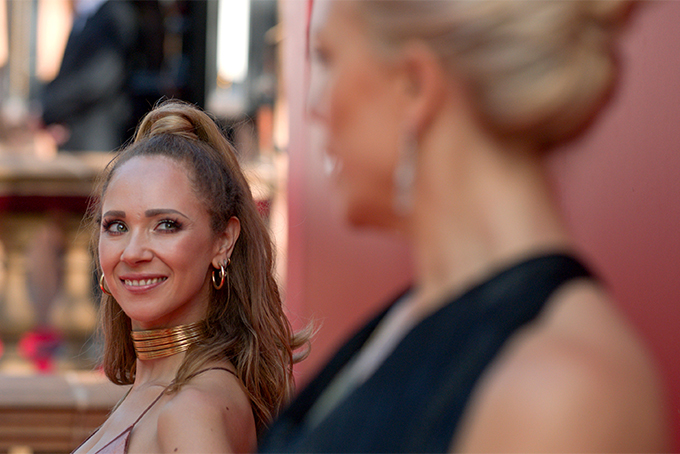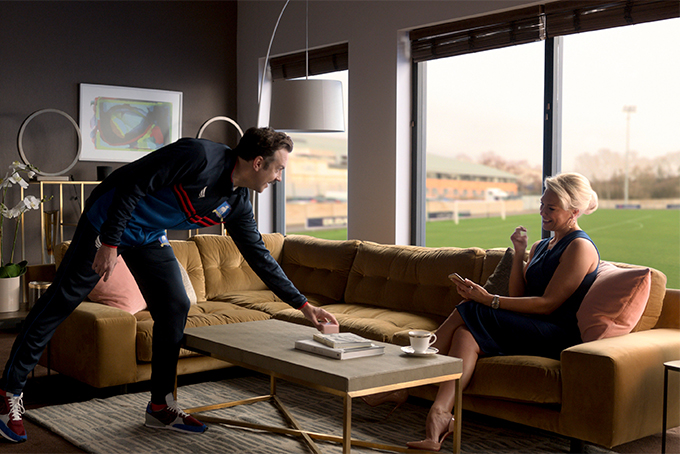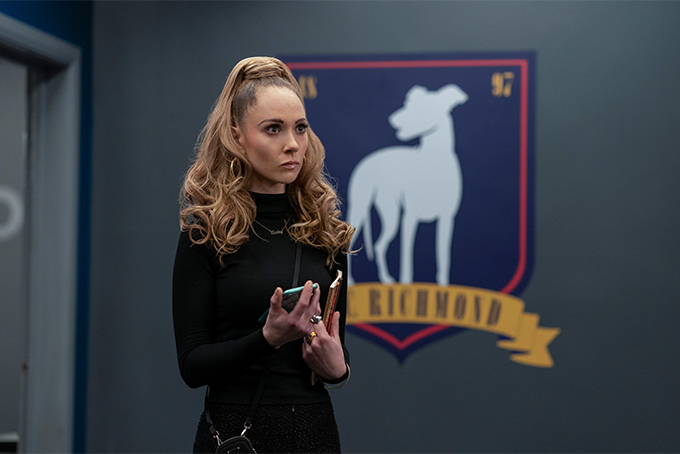When Jason Sudeikis and his co-creators were developing Ted Lasso, it would have been so easy to lean on the marketing gimmick the show is based on: a series of NBC Sports Promo advertisements from 2013, starring Sudeikis as an earlier version of Ted Lasso, then also an American football coach imported to helm an English Premier League team. This Lasso was equal parts cornfed yokel and bumbling, irate blowhard. That cruder sketch of the character is almost nowhere to be found in the Apple TV+ version of Lasso, who—like the comedy he stars in—is gently quixotic and deeply intelligent.
The show, as astonished and delighted audiences would quickly come to find (and talk about, and talk about some more), is about accountability, growth, and acceptance. It was golden-hearted and, even better, genuinely funny. It was an emotional lifebuoy tossed out to viewers in the throes of the pandemic. It blew up in a way that few expected. As of last week, it has 20 Emmy nominations.
Two of those nods have deservingly been handed to Ted Lasso’s actresses, Hannah Waddingham and Juno Temple. Waddingham plays Rebecca Welton, who exemplifies the active-growth mindset that the show shouts gleefully from the rooftops. Rebecca is a character primed for villainy. The new owner of football team AFC Richmond, she’s hellbent on sabotaging their chances as revenge on her ex-husband. She’s cold and calculating—hurt people hurt people, after all—and doesn’t care about using Ted as a pawn. Not at first, anyways. Her ice queen demeanor is gradually melted by the kindness of others; she’s guarded and wounded, but eventually she blossoms.

The woman who successfully chips away at Rebecca’s emotional walls is Temple’s character, Keeley Jones. Keeley is bubbly and cheeky, the older girlfriend of Richmond’s resident hotshot. She could have been an airhead. Instead, her emotional intelligence and her wit are off the charts. (Sensing a pattern yet?) She and Rebecca meet in the first season’s third episode, and it would have been so easy right then and there for the writers to pit the influencer and the executive against one another. But they bring out the best in each other, and by the fourth episode are sharing a rickshaw ride, merrily drunk off a bottle of champagne each.
Ted Lasso has no true antagonist, but now that Rebecca is starting the second season firmly allied with Ted and the rest of Richmond, tension will have to come from somewhere else. The show has found that conflict in the form of Dr Sharon Fieldstone, played by Sarah Niles. Niles’ very competent and no-nonsense sports psychologist rankles the usually happy-go-lucky Ted. She has no time for his attempts to win her over, and his aggressive niceness piques her professional curiosity, unsettling him. How he’ll take to therapy, as well as Richmond’s draw streak, Rebecca’s quest for love, and the mysterious origins of Led Tasso, are the central questions of the season.
So because we couldn’t get “Trent Crimm, The Independent” to write up what we learned on such short notice, maybe you’ll take it from the stars themselves. Here, Waddingham, Temple, and Niles sit down to speak with Vogue Singapore about playing women, what Ted Lasso has meant to them, and what makes the world a better place.

How much do you think the pandemic contributed to the show’s success? Do you think audiences were hungry for positivity?
Juno Temple: I think people were hungry for positivity before the pandemic, I’m not gonna lie. I think that was something that people have been hungry for, for a long time. I think the pandemic definitely meant that people couldn’t go outside. They were at home, so they got to sit and think about things maybe more than they have ever allowed ourselves to. It meant a moment of pause, but it also meant maybe there was this moment of stillness that made us aware of the pain going on around us. You start to realise what’s lacking in your own life—positivity and caring and nurturing, and listening and kindness and forgiveness mean so much more than we maybe allow our brains to think about. At least, on a day-to-day basis.
Do you feel like this show has given you the opportunity to make a better world, in a small way?
Hannah Waddingham: Absolutely. Juno and I were saying the other day—greater than any nomination, greater than any review was that we heard from a mum that she had decided not to wait until her child was older to show her [Ted Lasso]. She wasn’t going to worry about the swearing and this and that. She wanted to show her how women can bolster each other up… how women should relate to each other, how women should have each others’ backs, and to step down to let the other one forward. To Juno and I, that was just immense, that we might have done that for one woman with her child was just incredible. It’s a real privilege to be given these two roles that are making that kind of a difference.
Sarah, as a newcomer, how hard was it to keep a straight face while filming?
Sarah Niles: It was hard. There’s a bit of ad-libbing going on. Jason’s very funny; everybody’s funny. Most of my scenes I filmed with Jason. To keep a straight face, I kept the question in my mind: What else is going on here? What’s beyond the smile and the laugh? You’ve seen this light-hearted side of Ted. What’s beyond that? That kept me on track. But it was hard.

Are you much like your character? What kind of research did you do to prepare to play her?
SN: I just worked with the script. And Jason pointed me in a lot of directions, books to have a look at. And I guess a lot of it was trying to be the opposite of me. I’m a little bit kooky, a little bit bumbly. And she’s very measured. She knows more than you do. But she wants the best for the team—and that’s the heart of it. So that was the angle I started with.
Speaking of Jason, it is such a tonic to see a male-female relationship onscreen that is purely platonic and supportive, like the kind that Ted and Rebecca have, without ever hinting at it getting romantic. We don’t often see that kind of thing on television. How do you and Jason titrate that chemistry?
HW: Do you know what? It’s so funny that people might go, “Oh, Ted and Rebecca, will they, won’t they?” It’s never been in my head, that they would ever be [something more]. I was so much in that tunnel-vision of Rebecca’s desire to destroy Rupert [her ex-husband]—when Ted walks through that door, she doesn’t care where he’s come from, who he is. Nothing. She totally baulks against this wonderful person who’s come into her life. But the writing is very clever. And if people want to see that there’s something there, they see it. And other people might see that, no, they’re just each other’s angel. They’re each other’s protector, and they don’t even realise it. Thankfully, Jason and I naturally have that chemistry. It’s a given; we never even talked about it. That’s how it should be. It should be effortless.
Keeley is such a bright, shining spot on a very wonderful, but very male-centric show. What’s it like playing her?
JT: She’s definitely the character with the biggest heart that I’ve ever been privileged to play. What’s funny about the show is that it’s a very male-dominated cast, right, but there are a lot of men on it that are some of the biggest feminists I know. They really believe in the power of women and the power of what women can do when they support each other, and help guide each other into being the best versions of themselves, and being comfortable in their skin.

What has she taught you?
JT: I think Keeley, she really cares about people and really cares about helping people find ways to be happy being themselves. I can’t help but take that into my real life. She’s completely saved my life in a time where, as the whole world, we all felt such sadness. It was one of the worst periods of my life. I think getting to play her has completely infected me with joy and positivity, wanting to help out my friends and family. I’m so grateful for her, and grateful for the positivity and the female fantastic-ness she puts out into the world.
Were you a fan of the show before you booked the role, Sarah?
SN: No, I wasn’t. I said to a friend, “I’ve got an audition for this show.” And he was like, “You’re doing that? You need to watch it.” And I didn’t—I did the first audition, and then I started to watch, and I realised: This is really good. I really need to get this job. It was just so full of love and heart and truth… I thought: I have to be a part of this. I have to be a part of this. I was thrilled when I got the part. Everybody’s so warm. It’s like a real family. And then you start to think: I’m the new one. Ahh! The nerves start setting in. But everyone’s been so supportive. The whole team, really.
What do you love most about your character?
SN: What I love about her is her boldness, just her straight-talking. I could do with a bit more of that… I love how she’s really professional. She isn’t afraid to say that she’s good at her job. It’s a fine balance, isn’t it? Without coming across as arrogant, just simply saying, “I’m good at what I do.” I love the idea of the journey she’s been on to get to that point. And being a female psychologist in an environment that’s largely run by men. I really enjoyed it. And I really enjoyed trying not to give too much away.

Rebecca’s arc this season is about realising that she needs to open herself up to being vulnerable to love, and to explore her sexuality. How do you feel about that storyline?
HW: I like the fact that they’ve still made Rebecca completely warts-and-all. She absolutely does not know what the hell she’s doing, who the hell she wants to be with, or how to go about [doing] that. I love the fact that I’m getting a chance to show that because she’s the boss, she has to find the softness and the young girl in her again. I really hope that the audience goes, “Oh, god! Oh no! Don’t look away from him! Now look at him! Give him a kiss now! Oh, god!” I want them to feel like she’s their friend… I really hope that people enjoy where Rebecca’s at.
What can you tell us about Keeley’s relationship with Roy? Where they left off in Season 1, and what will happen next?
JT: The last thing that Brett [Goldstein, who plays Roy] and I got to shoot together in the locker room is one of my favourite scenes I’ve ever shot, in my entire career… Watching it back, I was so lost in it. I thought it was such a profound scene between these two humans that are, you know, gently falling in love with each other and letting each other in. And then the challenge of Season 2 was the pandemic…. It did mean that you couldn’t hang out with your co-stars on your days off. Brett and I were talking about wanting to stay connected, because that stuff is so important. We wanted to send each other music and quotes and things that were just ours, to maintain being connected during the season. That was something that was really precious to me. I loved it; I love working with Brett Goldstein so much.
Ted Lasso is such a story about believing in yourself. What makes you believe in yourself?
HW: In real life? My little girl. My little girl does. When I’m—any of us who have children here—feeling low, or when you’re feeling like you’re pacing yourself too thinly, it’s the way they look at you. Like when I pick her up from school, it doesn’t matter if I saw her that morning, she always goes: “Mummy!” And runs to me. She makes me realise that I’m doing okay, that I’m doing a good job. I worry because I’m a working mom, and I’m working at a level where I need to give so much to my work. I feel like I’m doing the right thing. She makes me believe in myself more, because she wouldn’t respond to me like that unless I was doing all right.
The second season of Ted Lasso will premiere this Friday, 23 July on Apple TV+.





